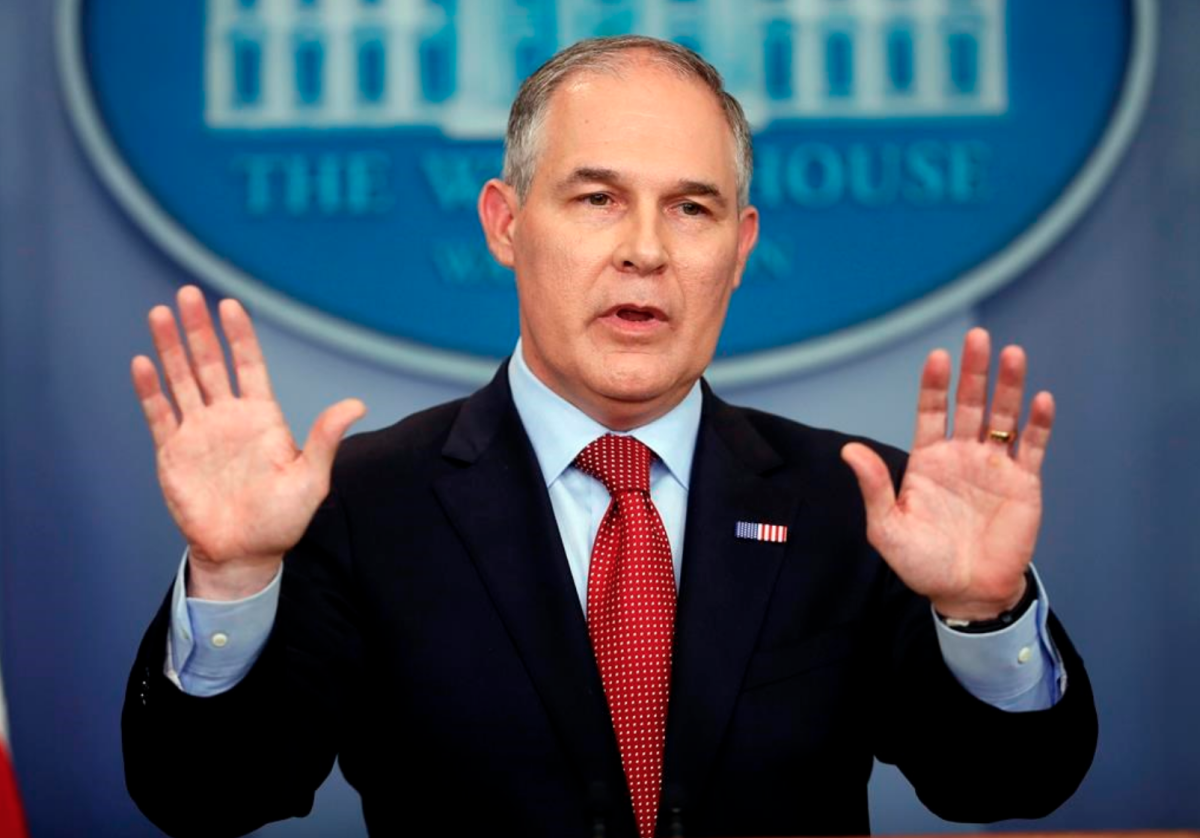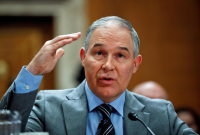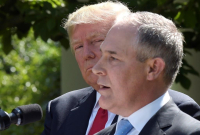Support strong Canadian climate journalism for 2025
The Trump administration has announced new plans to weaken environmental rules that could place the Trudeau government in a climate change bind.
The announcement by Environmental Protection Agency (EPA) administrator Scott Pruitt, that proposes to weaken tailpipe pollution standards on new cars, delivers another Trump-era shock to Canada, which has worked for years with the United States to align transportation emissions standards.
Pruitt — who has said climate change could benefit humans, despite overwhelming scientific evidence it will lead to massive loss of life — announced Monday that the rules restricting carbon pollution from vehicles, a major cause of the planet's warming, are "not appropriate" and “should be revised."
The existing standards were initially developed by the former Harper government in Canada, in partnership with the Obama administration, following a push from California and Quebec.
The Trudeau government later reaffirmed those regulations in 2016, but may now be left on its own if it wishes to proceed.
“The Obama administration's determination was wrong,” Pruitt is quoted as stating, in an attack on the former operation of his own agency. “Obama’s EPA...set the standards too high.”
Canada may be forced to pick between following weaker U.S.-wide rules, and stronger rules in places like California, which has been given a waiver to impose stricter standards. Pruitt said Monday he was going to examine that waiver.
“Co-operative federalism doesn’t mean that one state can dictate standards for the rest of the country,” he stated, according to the press release.
“EPA will set a national standard for greenhouse gas emissions that allows auto manufacturers to make cars that people both want and can afford — while still expanding environmental and safety benefits of newer cars," he continued.
"It is in America's best interest to have a national standard, and we look forward to partnering with all states, including California, as we work to finalize that standard.”
The chair of California’s clean air agency shot back, calling Pruitt’s move a “politically-motivated effort to weaken clean vehicle standards with no documentation, evidence or law to back up that decision.”
“This is not a technical assessment, it is a move to demolish the nation’s clean car program,” said Mary D. Nichols of the California Air Resources Board in a press release.
“EPA’s action, if implemented, will worsen people’s health with degraded air quality and undermine regulatory certainty for automakers.”
Cutting transportation emissions is a major element of the Trudeau government’s plan to reduce its carbon pollution and meet its obligations under the Paris climate agreement.
Transport is the second-largest carbon pollution sector in Canada, at 173 megatonnes of carbon dioxide equivalent in 2015, and emissions rose 36 per cent since 1990, accounting for a significant portion of emissions growth.
In 2014, Canada amended its regulations explicitly “in collaboration” with the EPA, in order to put in place progressively stricter standards from 2017 to 2025. In 2016, the two countries committed to “ensure further acceleration of the improvement of vehicle efficiency.”
U.S. environmentalists and scientists have accused Pruitt of gutting the EPA and cancelling important efforts to crack down on carbon pollution because he disputes scientific evidence that shows how much human activity is contributing to climate change.
The Trudeau government was also forced to deploy a "multi-pronged" lobbying effort against the Trump administration in 2017 to counter other cuts at the EPA which threatened Canada's energy efficiency policies by scaling back funding to the ENERGY STAR program, created to encourage lower energy consumption and greener jobs.
Meanwhile, Pruitt has been embroiled in an expenses scandal, after spending hundreds of thousands of dollars in public funds for a trip to Italy, including a security detail alone that cost over $30,000. He has been facing mounting calls to resign over this and other revelations in the news.
Environment Minister Catherine McKenna told the Globe and Mail that reducing gasoline consumption is key to lowering emissions over the next 12 years ahead of Canada’s 2030 Paris Agreement target.
“Improving the fuel efficiency of our vehicles cuts pollution and saves drivers money,” spokeswoman Caroline Thériault told the newspaper.
“We are paying close attention to the U.S. mid-term review of vehicle fuel-efficiency standards...any decisions regarding vehicle regulatory changes will be informed by our own midterm evaluation and by careful considerations of environmental and economic impacts.”
McKenna also told CTV Question Period on Sunday that "I don't have time for politicians that pretend that climate change isn’t real."
The U.S. Union of Concerned Scientists says stricter fuel efficiency standards will actually save U.S drivers $50 billion USD by 2030. It has calculated that 2017–2025 fuel efficiency and emissions standards will save an average buyer $6,000 for a 2025 vehicle over its lifetime.
“Vehicle efficiency standards keep vehicles affordable. Though increasing vehicle efficiency comes at a modest cost, the cost of the most affordable vehicles has remained effectively constant over the past decade even though today’s vehicles are more efficient and cheaper to drive,” it states on its website.






Comments
Pruitt's misguided plan may mean that we have to find ways to hasten the transition to electric vehicles.
Pruitt has been one of the most successful of trumps appointees and is easily the most competent head of the epa ever.
He is not being run over by the highly politicized bureaucracy there and has returned accountability to the research by requiring all data to be published.
Tougher Fuel Economy regs are not necessary as the world is awash with affordable oil reserves. And the Air in America’s (and Canada’s) cities is cleaner than it has EVER been.
The significance of AGW remains unproven ( even the far left in New York must think so as they demanded that trump okay funding for a tunnel upgrade to Manhattan that Won’t be finished for decades when the island is supposed to be underwater) so there is no reason on that front either.
Canada obviously needs to follow suit as the cost of transportation is even more impactful on its economy than it is in the US.
Excellent reasoning, Gord! And don't forget that transportation will become much less expensive, now that the earth is flat again!
Thanks for reading my comment. Naturally you respond with an insult rather than any factual argument- that is the MO of the alinskyite left.
In Canada, the transportation sector is the second largest emitter after the oil and gas sector. In 2014, GHG emissions from the transportation sector were 171 Mt, roughly 23% of total Canadian GHG emissions. GHG emissions from the transportation sector have been growing at an average annual rate of 1.1% since 1990 compared to 0.7% for Canada's total emissions.
The largest source of transportation emissions comes from passenger transportation. In 2014, passenger transportation accounted for 55% of total GHG emissions from the transportation sector, or 95 Mt. The growing trend of "consumer preference" for SUV's and light trucks has resulted in GHG emissions from light trucks more than doubling, from 22 Mt in 1990 to 50 Mt in 2014, which has more than offset reductions in passenger car emissions from 52 Mt in 1990 to 36 Mt in 2014.
Emissions from freight transportation have more than doubled, from 24 Mt in 1990 to 55 Mt in 2014. Despite generally being the most energy-intensive and highest-cost mode of freight transportation, moving freight by truck has increased in recent decades as a result of increasing consumer demand for manufactured goods, just-in-time production models, and door-to-door delivery to consumers.
(source: National Energy Board, 2016-07-14: "Market Snapshot: Increased GHG emissions from the transportation sector reflect major consumer and business trends")
Car producers are bombarding us with publicity promoting big pickup trucks and large SUV's (you don't see any publicity promoting hybrid cars or electric cars). In the 1970's, reacting to a spike in oil prices, car producers started to build smaller and more efficient cars. The price of gasoline is to low these days to be an incentive for people to move back to less energy consuming vehicle. If the federal government is serious (which I doubt) about reducing Canada's GHG emissions, it should immediately implement a carbon tax that will hike the price of gasoline to a point where people will change their behaviour, or tax vehicles that consume to much. We can keep going on and on criticizing the oil industry, but as long as people continue to buy vehicles and other products that burn more and more energy and produce more and more pollution, Canada's GHG emissions will continue to go up. The federal government have to intervene and quickly, not only by keeping the actual emissions standards but making them more stringent.
The LPCs own advisors say that a tax of 300$/Ronney would be required to - in theory - get Canada on track to meet carbon emissions targets.
That’s a 22 billion per year tax.
The LPC knows that they would be reduced to single digits number of seats if they brought that rate in.
And they and you want to impoverish Canadians based on dubious theory.
I would actually agree that trying to rely mainly on carbon taxes to drive emission reductions is foolish. Oh, sure, have a carbon tax, it will no doubt help some. But various factors make demand for fossil fuels fairly inelastic--and particularly so for the poor, who for instance have little control over the energy efficiency of their homes and cannot afford the up-front costs of efficiency/sustainability improvements even if they would save money in the long run.
Government needs to lead in more substantive ways, both in terms of all-out regulation and to hell with the supposed "inefficiency", and in terms of positive programs of enabling and subsidizing changes in transportation, heating and so on, not to mention simply building more transportation infrastructure. Back years ago, Jack Layton proposed a setup where government inspectors would go around to everyone's home, check the energy efficiency, figure out what improvements could be made, line up a contractor, and offer a low-interest loan such that you get the work done and the cost of the loan is paid for by your energy savings--until it's paid, after which you just get the savings. Win-win-win; people get this stuff done that they might have done ages ago if they felt like going through all the planning and finding a loan and stuff, local contractors get a bunch of work, economy's boosted, lots of energy is saved. This is the kind of thing that government can do that, however the theory might go, won't actually happen in the "free market" without some goosing.
People are going to be richer physically and environmentally. They are going to have a better life with less pollution. Vehicle pollution (especially diesel) kill thousands of people around the world and destroy the environment. The money from a carbon tax will be invested in hospitals, schools, public transit, renewables and other sectors that will help people not impoverish them (Sweden has a carbon tax of around $150 per ton and according to a latest report they are one of he happiest people in the world). Transportation is one sector were GHG emissions continue to grow and governments have to do something about it. Climate change is an existential threat that will (and actually is) impoverish everybody on this planet. It is time to act; we have already lost to much time.
I'am sorry I was wrong. Sweden carbon tax is actually at "Can$216 per tonne".
Sweden introduced a CO2 tax in 1991. Since Sweden had a GDP growth of 60%, and at the same time have reduced its GHG emissions by 25%.
Sweden's goal to reduce GHG emissions compared with 1990 (not 2005 like in Canada) by 40% by the year 2020 (30% by the year 2030 in Canada), and to have a "vehicle fleet completely rid of fossil fuels" by 2030 are stepping stones to the overarching goal of a society with no net GHG emissions by the year 2050.
In 2005, the Swedish government introduced tax reliefs to power-intensive industries in exchange for their drawing up energy plans and taking steps to reduce energy use.
For households, government information on how to save energy is widely available. Each municipality (there are 290 in Sweden) has an energy adviser to whom people can turn for help and guidance.
Another way in which Sweden is trying to lead the way to a more sustainable planet is through innovative sustainable solutions. Expenditure on R&D represented 3.3% of GDP in 2013, the fourth highest percentage in the OECD. According to the OECD Environmental Performance Review 2014, Sweden is one of the most innovative countries when it comes to environment-related technology, and rank fourth in the Global Cleantech Innovation Index.
According to current projections, Swedish emissions will have decreased by about 16 million tonnes in 2020, so in order to speed up the reduction the government has to come up with more drastic measures.
According to Swedish Minister of Finance Magdalena Anderson, a CO2 tax is relatively easy to administer and the tax revenues can be used where they are judged to contribute best to the overall goals for the society.
"So, putting a price on carbon is not only the morally right thing to do," said Anderson, "it's also economically smart politics."
Anderson also argued that now is the time to put a price on carbon, and phase out fossil fuel subsidies (Trudeau has promised to phase-out fossil fuel subsidies but still has done nothing).
"Climate change is the largest challenge of our generation, and we just have to do something about it," said Anderson.
"We have all the facts, we now how to stop climate change, we just have to do it."
(source: The World Bank, May 16, 2016: "When It Comes to Emissions, Sweden Has Its Cake and Eats It To")
Not if it was done properly. The way to do it is fee and dividend. For example, a $300 per tonne fee, and ALL this money returned to all the people, everyone getting the same amount. In this way most of the people will get more money back than they spent. This will provide the incentive needed to people to reduce their greenhouse gas emissions by making better choices. This is the method James Hansen suggests; the difficulty with it is persuading politicians to actually do it - they see all these $ and think they have better uses for the money.
To anybody supporting a carbon tax: You feel free to donate all the money you want but you can leave my money alone. Politicians seem to have convinced you empty-headed folks that taxing the most common element in the universe is going to accomplish what, exactly? We get taxed and the politicians do what with OUR MONEY? The carbon tax revenue will be squandered on who knows what, or just dispersed into general revenue. Please explain how that lowers the earth's temperature? Has anybody come up with an algorithm that calculates the number of million/billion/trillions of dollars to lower the earth's temperature by 1 degree C? You people have drank the Kool-aide so deeply that you don't even question your leaders as to just what they intend to piss your tax money away on, and with ZERO effect on the carbon level or climate of the planet, but you all step up and demand we all pay and pay and pay into this money-grabbing scam but nobody is demanding they explain where this money will be wasted, er, I mean 'invested'. It will become a giant slush-fund for the incumbent political party to BUY our future votes with beads and trinkets. How gullible do you have to be to accept this moronic plan at face value and not ask the most basic questions and demand accountability? Now I know how our current Prime Minister got elected... Canada is infested with very stupid people.